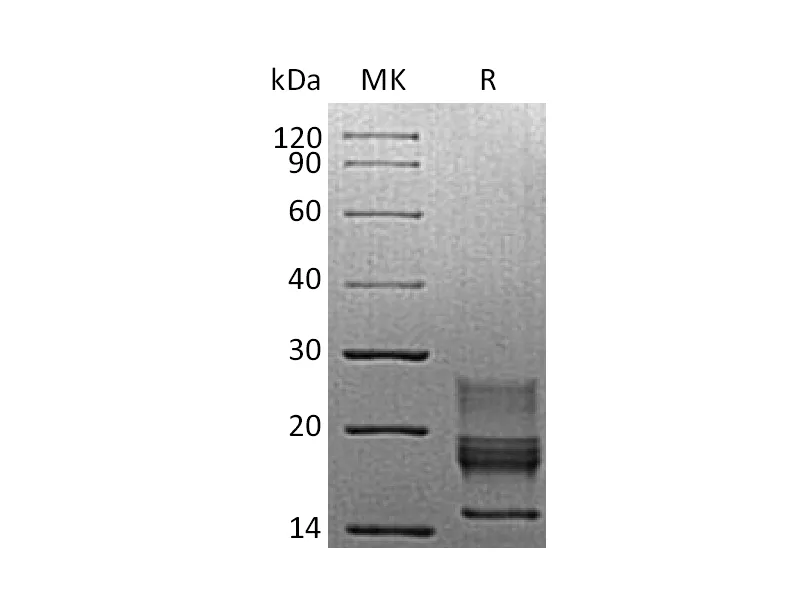
Size2:50μg price2:$186
Size3:500μg price3:$1250
| Name | Recombinant Mouse IFN gamma (C-6His) |
| Purity | Greater than 95% as determined by reducing SDS-PAGE |
| Endotoxin level | <1 EU/µg as determined by LAL test. |
| Construction | Recombinant Mouse Interferon Gamma is produced by our Mammalian expression system and the target gene encoding His23-Cys155 is expressed with a 6His tag at the C-terminus. |
| Accession # | P01580 |
| Host | Human Cells |
| Species | Mouse |
| Predicted Molecular Mass | 16.6 KDa |
| Buffer | Lyophilized from a 0.2 μm filtered solution of PBS, 5% Trehalose, pH 7.4. |
| Form | Lyophilized |
| Shipping | The product is shipped at ambient temperature.Upon receipt, store it immediately at the temperature listed below. |
| Stability&Storage | Lyophilized protein should be stored at ≤ -20°C, stable for one year after receipt. Reconstituted protein solution can be stored at 2-8°C for 2-7 days. Aliquots of reconstituted samples are stable at ≤ -20°C for 3 months. |
| Reconstitution | Always centrifuge tubes before opening.Do not mix by vortex or pipetting.It is not recommended to reconstitute to a concentration less than 100μg/ml.Dissolve the lyophilized protein in distilled water.Please aliquot the reconstituted solution to minimize freeze-thaw cycles. |
Alternative Names
Ifng; Interferon gamma; IFN-gamma
Background
Mouse Ifng is a secreted protein which belongs to the type I I (or gamma) interferon family. IFNG is produced by lymphocytes and activated by specific antigens or mitogens. In addition to having antiviral activity, IFNG also has important immunoregulatory functions. It is a potent activator of macrophages and has antiproliferative effects on transformed cells. It can potentiate the antiviral and antitumor effects of the type I interferons. Genetic variation in IFNG is associated with the risk of aplastic anemia (AA) which is a rare disease in which the reduction of the circulating blood cells results from damage to the stem cell pool in bone marrow. In most patients, the stem cell lesion is caused by an autoimmune attack. T-lymphocytes, activated by an endogenous or exogenous, and most often unknown antigenic stimulus, secrete cytokines, including IFN-gamma, which would in turn be able to suppress hematopoiesis.
Note
For Research Use Only , Not for Diagnostic Use.
